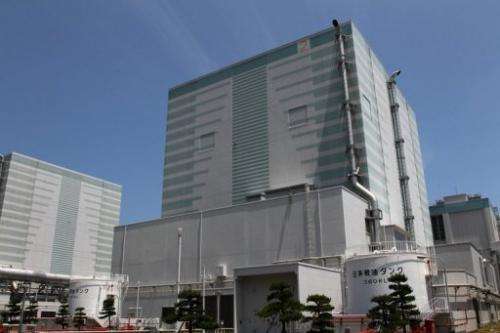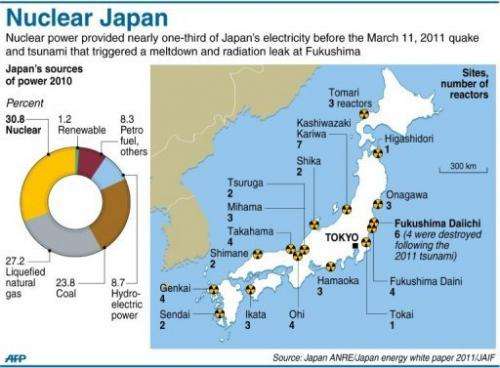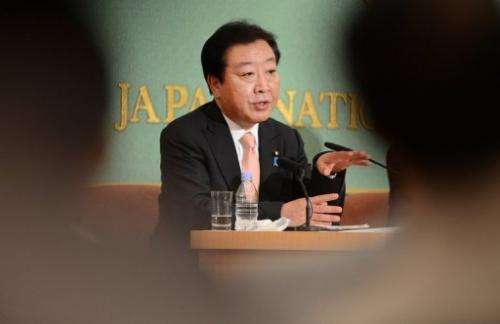Japan to phase out nuclear energy by 2040

Japan on Friday said it planned to phase out nuclear power over three decades in an apparent bow to public pressure after last year's Fukushima disaster, the worst atomic accident in a generation.
Tokyo's ambitious goal would see the nation work to cut its use of nuclear energy to zero by 2040, permanently shutting down a stable of reactors that once supplied resource-poor Japan with about one-third of its energy.
"We will introduce policies to bring nuclear power generation down to zero within the 2030s... so that we can build a society that does not rely on nuclear power as early as possible," national policy minister Motohisa Furukawa told a press briefing in Tokyo.
But a government paper also released Friday acknowledged that "opinions are divided over how soon or exactly how such a society can be achieved".
The move would bring Japan into line with Italy, Switzerland and Germany, which has said it will wean itself off nuclear power by 2022.
Ahead of a general election expected this autumn, nuclear energy has become a hot issue in Japan with protests that sometimes attract tens of thousands of people calling for it to be ditched.
The issuing of a policy goal is not binding on any future government, and a new administration could reverse the plan.

Some protesters who had gathered for the weekly demonstration at the Prime Minister's office welcomed the decision.
"I think it is one step forward that the government said it will aim to bring nuclear power down to zero, even if it is only formality," said Yasumichi Noma, 46.
But others were sceptical. "It is so phony. The government has no intention to drop nuclear, that's what I believe," said 53-year-old Tomoyasu Kuzuoka.
Last week Prime Minister Yoshihiko Noda's ruling Democratic Party of Japan (DPJ) recommended the country make greater use of renewable energy and take further energy saving measures, including the use of smart metering.
It also said Japan should develop resources in nearby waters and look to cheaper procurement of liquefied natural gas and other fossil fuels.
But Japan's powerful business lobby has worked hard to push for a restart of shuttered reactors, fearing power shortages and warning of soaring utility bills.
"There is no way we can accept this—I cannot think this is technologically possible," Hiromasa Yonekura, chairman of the Keidanren, or Japan Business Federation, said of the new policy.

Many critics view a nuclear-free Japan as unrealistic and warn that the move away from atomic power could have severe consequences for manufacturers and the world's third-largest economy.
Tokyo's new energy policy calls for shutting down reactors that are more than 40 years old, not building any new nuclear reactors and only restarting existing reactors if they pass standards issued by a new regulatory agency.
Greenpeace "cautiously welcomed" the new policy, but said the decades-long timeline was unnecessary since all but two of Japan's 50 reactors remain switched off in the wake of the Fukushima crisis.
"The government and energy utilities must make every effort to rapidly phase out nuclear power and deploy renewable solutions to avoid future disasters," it said in a statement.
The decision comes a year-and-a-half after a huge tsunami swamped reactor cooling systems at the Fukushima Daiichi plant, sparking meltdowns and radiation leaks in the worst atomic accident since Chernobyl in 1986.
In the months that followed, all of Japan's working reactors were shut down for routine safety checks, with only two of them ever having been restarted, and those in spite of strengthening anti-nuclear public opinion.
Japan is now heavily dependent on Middle East oil and has been forced to ramp up its imports to make up the energy shortfall since the accident.
Germany last year said it would shut down its 17 nuclear reactors by 2022 and the German government on Friday offered Japan technical help with the shift away from nuclear power.
In Italy a referendum rejected any resumption of nuclear energy generation after the Chernobyl accident. Switzerland intends to close its five reactors by 2034. However a number of Asian countries are expanding their nuclear programmes.
(c) 2012 AFP





















